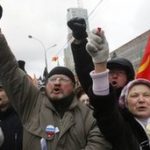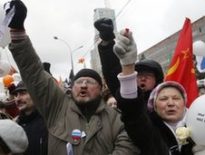(Reuters) – As night fell over Benghazi, a familiar sound echoed across the eastern Libyan city – an explosion, and then gunfire. A bomb had just been thrown at a police car on patrol, injuring an officer.

It was the latest of many attacks on local security forces. Two months before, the man whose job it was to ensure Benghazi was safe, the police chief, was shot dead outside his home.
Two years after Libya’s second city kindled the uprising that ousted Muammar Gaddafi, it epitomises a popular revolution gone awry – rival militias and Islamist gunmen more powerful than the police, moving residents to ask: where is the state?
“Imagine a city taken over by militias when all you want is to support the state,” activist Mohammed Buganah said. “People feel insecure. They are very upset and annoyed about this.”
There have been assaults on diplomats and international missions, including the September 11 killing of the U.S. ambassador, amid a rising tide of kidnappings, bombings and assassinations, mainly of security officials.
The anarchy, along with garbage-strewn streets and unraveling municipal services, have deepened a sense of neglect by the capital Tripoli far to the west and reawakened demands for autonomy in a region with most of Libya’s oil wealth.
“Everyone is increasingly worried about eastern Libya,” a diplomatic source said. “Things are seriously deteriorating.”
Reinstating basic security across Libya is a priority, especially in Benghazi, cradle of the February 17 revolt against Gaddafi but now seen as a foothold and springboard for Islamist militancy once suppressed by the dictator.
Interior Minister Ashour Shuail singled out his home town as part of a mammoth project in building an effective police. “The security is getting better and the attacks are dwindling,” he said in early January. “It is not as bad as it was.”
But a few weeks later, a curfew is now being considered in the Mediterranean coastal city of nearly 1 million people.
NO ONE IN CHARGE
Another activist, who declined to be named for his own safety, said: “There isn’t anyone fully in control of Benghazi.”
Former anti-Gaddafi rebels claim to have been absorbed, at least symbolically, into the interior ministry, like the Supreme Security Committee, and military.
But fighters for such factions as the Libya Shield, February 17 and Raffalah al-Sahati boast more firepower than the police or army and are estimated to number in the thousands.
“Brigades control entrances into the city, streets, key infrastructure. The police don’t want to challenge them because they just don’t have the manpower,” said the activist.
Ansar al-Sharia, a radical Islamist group whose members witnesses say were at the scene of the September attack on the U.S. mission, was driven out of its base by protesters after a “Rescue Benghazi” rally by outraged citizenry.
Locals say the group, which once guarded a hospital and denied involvement in the assault, has since kept a low profile.
But analysts and activists say Islamist militants are amassing power on the ground even if their numbers are unknown. The police, seen guiding traffic or carrying out patrols, admit they are often powerless, and targets of attacks.
“We only have pistols and rifles. They have tanks and heavy weapons,” the chief of a downtown police station said. “We want to do our job but some police officers are simply afraid.”
Even if security forces make arrests, ensuing attacks discourage prosecutions. A police investigator is still missing after being abducted in early January.
“Everyday I check under my car and in my rear view mirror before I set off,” an officer who gave his name as Anis said. “I am proud to be a policeman but you have to be careful now.”
The violence is mainly against security forces and may be revenge attacks by former prisoners or militants seeking to stamp their authority. But without an effective army or police, authorities have little power to confront criminal suspects.
“Benghazans need the police (to) lift our morale,” one officer, also declining to be named, said. “But anyone who leaves his home for work every day is like a martyr.”
SENSE OF NEGLECT, ISOLATION
This is hardly the image Benghazans want for their city. But they concede that life has been disrupted by violence and unrest on top of demands for greater autonomy or investment in a region separated from Tripoli 1,000 km (620 miles) away to the west.
Benghazi’s security problems form the backdrop to more pressing civic grievances – a government failure to satisfy a public whose frustration has been simmering since rebel leaders left their eastern base for Tripoli in October 2011.
Long a pro-autonomy hotbed behind earlier attempts to unseat Gaddafi, Benghazi is now the focal point of a widespread sense that the new Tripoli authorities are still ignoring the east.
Benghazans point to rubbish-strewn streets, dirt track roads, hospitals and schools in need of basic upgrades. New shops have opened and building projects have resumed.
But they expect more.
“Where is all the money from the oil? Why are they not spending it to help us?” one female teacher said. “These politicians sit in their hotels in Tripoli and forget about us.”
The bigger issue is what status Benghazi will have in the new Libya and stake in national oil supplies of 1.6 million barrels a day – much of it from the east. Discontent has led to calls for return to a federal political structure.
For about a decade after Libya became an independent state in 1951, the North African state was run along federal lines, devolving power to the eastern, western and southern regions.
Benghazi was Libya’s commercial capital and the east had the cachet of being the family homeland of King Idris. Libya began to centralise its government in the last years of the monarchy. Gaddafi sped up the process after his 1969 coup, concentrating the power of the state in Tripoli and neglecting Benghazi.
“This is not new for us. Let people handle their problems,” said Abubakr Buera of federalist National Union party. “We are campaigning for political decentralisation and good governance.”
WESTERNERS SHUN BENGHAZI
Few Westerners live in Benghazi, which has borne the brunt of a wave of violence against diplomats and international bodies, including the killing of U.S. Ambassador Christopher Stevens and a gun attack on the Italian consul’s car this month.
Britain’s recent call to its nationals to leave immediately due to a “specific and imminent” threat to Westerners highlights the insecurity plaguing Benghazi.
The assault on the U.S. mission, for which no arrests were made, grabbed world attention. But there had already been attacks on British, Red Cross and U.N. properties here.
An Algerian hostage crisis in January, in which Islamist militants apparently entered from Libya and seized a natural gas plant before Algerian troops stormed it, leaving nearly 70 captives and gunmen dead, has raised regional security concerns.
Randy Robinson, principal of British School Benghazi, said: “One of our staff was carjacked. Our residence last spring was robbed with teachers in a room held at gunpoint as thieves cleaned out the apartments. We have to take care.”
Two years ago the anti-Gaddafi uprising had the strongest support in Benghazi but today a very different mood has emerged.
“Most people here would say they are very unhappy,” a local oil worker said. “Some say they are worse off than before.”
Benghazans want their city to be the economic capital again and bodies like the National Oil Corporation, founded in Benghazi and later moved to Tripoli by Gaddafi, to return here. They have given the government until February 15 to make a decision.
“(Politicians) said they would do many things but there is no change,” said Yussef al-Ghariani of the oil and gas workers’ union. “People say they will do another revolution.”





